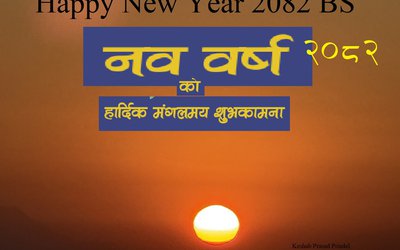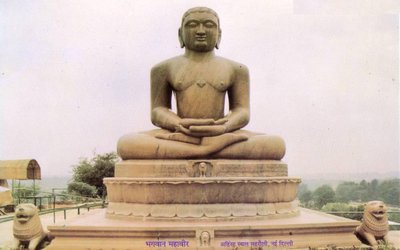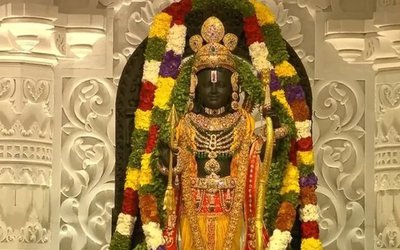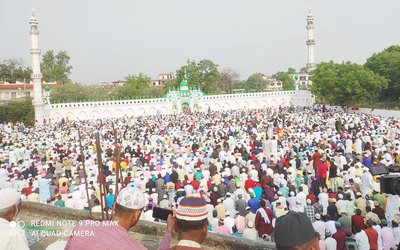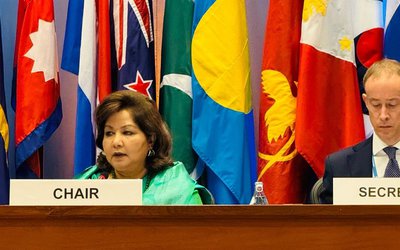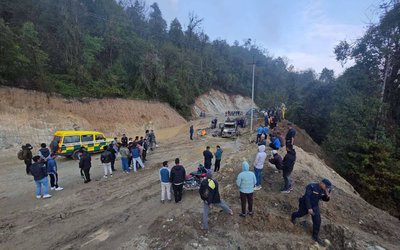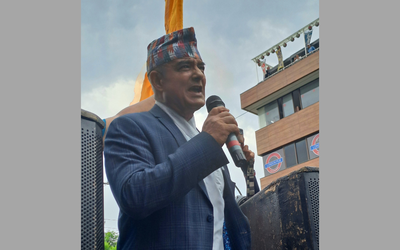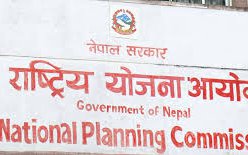
Nepal Government has corrected the date for a national holiday on Muslim Communities major festival Eid-ul-Fitr on Monday. Earlier the cabinet declared the Eid-ul-Fitr 2020 holiday on Sunday.
Eid-ul-Fitr marks the end of the holy month of Ramadan, especially the month-long fasting from sunrise to sunset.
Eid-ul-Fitr will be celebrated in the country on May 25 as the moon could not be sighted on Saturday, Shahi Imam of Jama Masjid said. Amid the COVID-19 outbreak and subsequent lockdown, Imama also appealed to people to offer Eid namaz at their homes.
A meeting of the Muslim Community was held here during the day. After the meeting it was announced that the moon was not sighted in Kathmandu and there was also no report from any part of the country.
They declared that the first Shawwal falls on May 25, therefore Eid-ul-Fitr will be celebrated on Monday. They also appealed to people to adhere to social distancing and lockdown guidelines of the governments and stay at home to offer Eid namaz.
"Eid is a festival of love and hugging your friends and neighbors, but now you cannot even shake hands due to coronavirus" says Old Delhi resident Akram Quereshi, summing up the somber mood ahead of one of the main festivals of the country.
All the mosques in the country, including Jama Masjid, are closed due to the pandemic. Alvida Namaz which is a congregational prayer at mosques in the month of Ramzan was offered by people at their homes on Friday.
The Namaz of Eid is also going to be offered by people indoors instead of visiting mosques and Eidgahs. "People have been requested by us to stay indoors in view of the coronavirus even during Ramzan. They should offer Namaz of Eid at home instead of visiting the mosques," said Muslim community leaders.
One of the most significant festivals that is celebrated by the Muslim community around the world, Eid-ul-Fitr marks the end of the holy month of Ramadan, especially the month-long fasting from sunrise to sunset. Muslims around the world celebrate Eid and wish each other a very happy Eid Mubarak. Eid falls on the first day of the month of ‘Shawwal’. On that day Muslims do not need to fast.
It should be noted that Islamic holidays follow the lunar calendar and not the Gregorian calendar. For a whole month, Muslims around the world fast, which is called Roza, and offer prayers while practicing self-discipline. They do charitable acts like feeding the poor and giving them alms. Normally, Eid is a joyous occasion wherein families and friends get together to celebrate the day. Upon the sighting of the moon, they wish each other ‘Eid Mubarak’ and exchange hugs and gifts. People wear new clothes and step out. This year, however, because of the pandemic, certain restrictions are in place and Eid will naturally be different.
It is believed that it was Allah who commanded Muslims to continue fasting until the last day of Ramadan. This year, Eid-ul-Fitr will begin on 23 May, Saturday and continue till 24 May, Sunday evening.
Considered as one of the most auspicious festivals of the Muslim community, Eid-ul-Fitr is celebrated all across the globe with much fanfare. The festival also masks the end of the Islamic holy month of fasting or Ramadan. It falls on the first day of the month of Shawwal. On that day Muslims do not need to fast.
All across the world, Muslims observe Ramadan by fasting from dawn to dusk. They end it when they see the moon, after which the celebrations follow. The date of Eid ul-Fitr, however, varies from one country to another depending on when the moon is seen.
It is believed that it was Allah who commanded Muslims to continue fasting until the last day of Ramadan. The same is also mentioned in the Holy Book, the Quran. They are later supposed to pay the Zakat al-Fitr before offering the prayers for Eid.
The festival is celebrated by donning new clothes, meeting friends and families. In several households, a feast is prepared as members of the family gather to partake in it. However, this year the celebrations are likely to be different owing to the lockdown in place.
- Foreign Minister Dr. Deuba Chaired Asia-Pacific region confronting
- Apr 21, 2025
- Nepal Electricity Authority cancels contract worth over Rs 1 billion, now electricity wires going to customers' homes are bare
- Apr 21, 2025
- Four people died in Taplejung after their vehicle caught fire after getting entangled in a live wire
- Apr 21, 2025
- RPP General Secretary Rana released on bail
- Apr 21, 2025
- Nepal requires Rs 21.165 trillion to implement SDGs goals
- Apr 21, 2025

